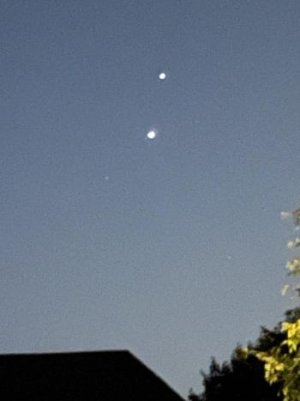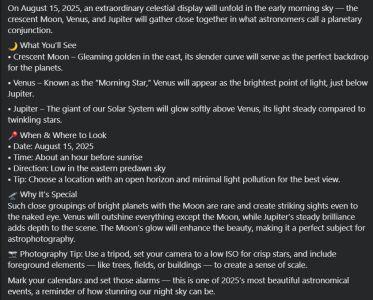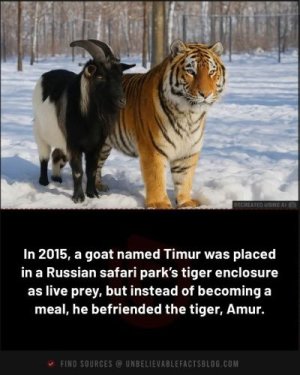The beach near my daughter's house overlooks Puget Sound and Mt. Ranier. It is an impressive chunk of vocanic rock, all right. White with snow even in the heart of summer.
You are using an out of date browser. It may not display this or other websites correctly.
You should upgrade or use an alternative browser.
You should upgrade or use an alternative browser.
The Science Thread
- Thread starter Louanne Learning
- Start date
Louanne Learning
Active Member
Member
New Member
Role Play Moderator
The beach near my daughter's house overlooks Puget Sound and Mt. Ranier. It is an impressive chunk of vocanic rock, all right. White with snow even in the heart of summer.
Close to where my niece is, in Seattle. She really likes it out there.
They live on an island and are very happy there. My niece lives a couple of hours away further up the Sound.
Louanne Learning
Active Member
Member
New Member
Role Play Moderator
[UNTITLED ODE TO THE WONDER OF LIFE]
by Richard Feynman
I stand at the seashore, alone, and start to think. There are the rushing waves… mountains of molecules, each stupidly minding its own business… trillions apart… yet forming white surf in unison.
Ages on ages… before any eyes could see… year after year… thunderously pounding the shore as now. For whom, for what?… on a dead planet, with no life to entertain.
Never at rest… tortured by energy… wasted prodigiously by the sun… poured into space. A mite makes the sea roar.
Deep in the sea, all molecules repeat the patterns of one another till complex new ones are formed. They make others like themselves… and a new dance starts.
Growing in size and complexity… living things, masses of atoms, DNA, protein… dancing a pattern ever more intricate.
Out of the cradle onto the dry land… here it is standing… atoms with consciousness… matter with curiosity.
Stands at the sea… wonders at wondering… I… a universe of atoms… an atom in the universe.
by Richard Feynman
I stand at the seashore, alone, and start to think. There are the rushing waves… mountains of molecules, each stupidly minding its own business… trillions apart… yet forming white surf in unison.
Ages on ages… before any eyes could see… year after year… thunderously pounding the shore as now. For whom, for what?… on a dead planet, with no life to entertain.
Never at rest… tortured by energy… wasted prodigiously by the sun… poured into space. A mite makes the sea roar.
Deep in the sea, all molecules repeat the patterns of one another till complex new ones are formed. They make others like themselves… and a new dance starts.
Growing in size and complexity… living things, masses of atoms, DNA, protein… dancing a pattern ever more intricate.
Out of the cradle onto the dry land… here it is standing… atoms with consciousness… matter with curiosity.
Stands at the sea… wonders at wondering… I… a universe of atoms… an atom in the universe.
Louanne Learning
Active Member
Member
New Member
Role Play Moderator
Reading more about Richard Feynman …
At the Galileo Symposium in Italy in 1964, he delivered a lecture titled “What Is and What Should Be the Role of Scientific Culture in Modern Society?”
He commented on the lack of mainstream understanding of and enthusiasm for science (a condition I believe persists):
How do we explain that, in Feynman’s words, “we live in (an environment that) is so actively, intensely unscientific.”
Do people want knowledge? Why, or why not? Doesn’t more knowledge increase the wonder of it all?
One of the main goals of my teaching career was to instill a sense of awe around what we were uncovering in class. (I taught senior biology, so it was easy.)
But, I knew teachers who just went through the motions and I am sure turned students off of science.
If the teacher doesn’t have the sense of awe, it can’t be passed on to the students.
I'd love to hear about your experiences in high school science.
At the Galileo Symposium in Italy in 1964, he delivered a lecture titled “What Is and What Should Be the Role of Scientific Culture in Modern Society?”
He commented on the lack of mainstream understanding of and enthusiasm for science (a condition I believe persists):
People — I mean the average person, the great majority of people, the enormous majority of people — are woefully, pitifully, absolutely ignorant of the science of the world that they live in, and they can stay that way … And an interesting question of the relation of science to modern society is just that — why is it possible for people to stay so woefully ignorant and yet reasonably happy in modern society when so much knowledge is unavailable to them?
How do we explain that, in Feynman’s words, “we live in (an environment that) is so actively, intensely unscientific.”
Do people want knowledge? Why, or why not? Doesn’t more knowledge increase the wonder of it all?
One of the main goals of my teaching career was to instill a sense of awe around what we were uncovering in class. (I taught senior biology, so it was easy.)
But, I knew teachers who just went through the motions and I am sure turned students off of science.
If the teacher doesn’t have the sense of awe, it can’t be passed on to the students.
I'd love to hear about your experiences in high school science.
Louanne Learning
Active Member
Member
New Member
Role Play Moderator
Louanne Learning
Active Member
Member
New Member
Role Play Moderator
I've a brother who closely watches meteorological data and travels all over the country to take photographs. He has some truly amazing shots.
Last edited:
Louanne Learning
Active Member
Member
New Member
Role Play Moderator
Louanne Learning
Active Member
Member
New Member
Role Play Moderator
Amazing photography of wildlife in the 8-minute video below - about coastal wolves - "sea wolves" - who lead a semi-aquatic lifestyle.
This is evolution in action. Sea wolves have evolved unique adaptations - like being expert swimmers and getting most of the diet from marine sources - that makes them a sub-species of the grey wolf.
This is evolution in action. Sea wolves have evolved unique adaptations - like being expert swimmers and getting most of the diet from marine sources - that makes them a sub-species of the grey wolf.
The problem is much deeper than most people realize.How do we explain that, in Feynman’s words, “we live in (an environment that) is so actively, intensely unscientific.”
- Human beings are motivated by reason and emotion. When the two are in conflict, in almost all cases emotion almost always Trumps reason. Now, in our North American capitalist and competitive culture, both business and political leaders want to motivate the public to act in their own self interest. Being aware that emotion is a much stronger motivating factor, they tailor their strategy to be pro-emotion and anti-reason. The children absorb this culture from their environment and become victims of a pattern of emotional and non-critical thinking. This anti-science attitude is not universal and inevitable. I grew up in a non-capitalist society (I won't say communist because only the slogans were as such) and, in high school, we LOVED science. When I arrived in North America and had to raise two teenagers, I was shocked at what a hopeless battle it proved to be to get my children interested and actively participating in science. As my daughter said, when I suggested that she could do a lot better in math and science, her reply was: "maybe I don't want to do better, maybe I'd rather be popular". That's when I gave up on education in North America.
Louanne Learning
Active Member
Member
New Member
Role Play Moderator
North American capitalist and competitive culture, both business and political leaders want to motivate the public to act in their own self interest.
But what we have witnessed is that emotion can also make people vote against their own best interests
I was shocked at what a hopeless battle it proved to be to get my children interested and actively participating in science.
In my experience as a senior biology high school teacher, the students in my classes mostly followed this breakdown:
About 50-60% of the class were achievers or over-achievers. They paid attention in class and participated. They did their homework and studied for tests. Usually, there were 2-3 overachievers among them. They had a bit more excitement about biology, and learning in general. When I think of them now, it’s all wide eyes and wheels in the brain turning.
About 30-40% of the class did what they had to do to get by. They met their responsibilities, more or less, but weren’t above copying homework. They didn’t prepare for tests as well as the achievers. Maybe biology wasn’t for them.
Less than 10% of the class had very little business being in senior biology.
I know, science isn’t for everyone.
But what we have witnessed is that emotion can also make people vote against their own best interests
I should have said "against their perceived self-interest" - the attitude is ultimately self-destructive, even if they do not realize it at the moment.
Given the number of North American students who do well in math and science, perhaps the challenge was not the educational system.As my daughter said, when I suggested that she could do a lot better in math and science, her reply was: "maybe I don't want to do better, maybe I'd rather be popular". That's when I gave up on education in North America.
Catriona, the scientist
So if your daughter had been educated in Bangladesh, she'd have grown up to be Einstein?That's when I gave up on education in North America.
Louanne Learning
Active Member
Member
New Member
Role Play Moderator
Shout out to Canada, who ranks up at the top of the Programme for International Student Assessment (PISA) ranking.
The results are based on evaluating 15-year-old students from 81 countries in the areas of math and science.
The results are based on evaluating 15-year-old students from 81 countries in the areas of math and science.
Louanne Learning
Active Member
Member
New Member
Role Play Moderator
From the PISA results:
Globally, in mathematics, boys outperformed girls in 40 countries and economies, girls outperformed boys in another 17 countries or economies, and no significant difference was found in the remaining 24. In reading, girls, on average, scored above boys in all but two countries and economies that participated in PISA 2022 (79 out of 81).
Globally, in mathematics, boys outperformed girls in 40 countries and economies, girls outperformed boys in another 17 countries or economies, and no significant difference was found in the remaining 24. In reading, girls, on average, scored above boys in all but two countries and economies that participated in PISA 2022 (79 out of 81).
Louanne Learning
Active Member
Member
New Member
Role Play Moderator
I couldn't be doing with biology. Physics was my thing. Although when we learned about the four-stroke engine, "suck, squeeze, bang, blow" would have been more interesting in biology, I reckon.
We have an interstellar visitor in our solar system right now. An object from interstellar space (likely a comet from another planetary system) wandered in and will pass by Mars in October before moving onwards from our solar system.

 en.wikipedia.org
en.wikipedia.org
This is only the third known interstellar object to enter our system!

3I/ATLAS - Wikipedia
This is only the third known interstellar object to enter our system!
Similar threads
- Replies
- 135
- Views
- 3K
- Replies
- 207
- Views
- 4K



